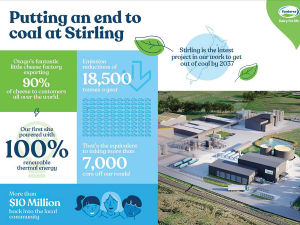Another Windfall for Fonterra Farmers, Unit Holders
Fonterra farmer shareholders and unit holders are in line for another payment in April.
 Fonterra says its Stirling cheese plant will switch from coal to wood biomass from August next year.
Fonterra says its Stirling cheese plant will switch from coal to wood biomass from August next year.
Fonterra's Stirling plant in Otago is to become coal-free by August next year.
By switching to wood biomass, the cheese plant's annual emissions will reduce by 18,500 tonnes of carbon dioxide - the equivalent of taking more than 7,000 cars off the road.
This will make Stirling Fonterra's first 100% renewable thermal energy site, a significant step towards the co-operative's goal of getting out of coal altogether by 2037.
Fonterra general manager operations Lower South Island, Richard Gray, says it's another huge decarbonisation milestone for the co-op.
"Sustainability is at the heart of our strategy and this project is something that will be good for the environment and local community. As well as the site being coal free, there are additional environmental benefits the new boiler will bring, including reduction in wastewater, noise, solid waste to landfill and air discharge emissions."
He also cites economic benefits for the community, including more than $10 million for the region, and an estimated 10 jobs in the wood biomass industry.
“Our Stirling site exports to customers in more than 10 countries, including Japan and South Korea, and we’re looking forward to sharing this news with them also.”
The wood biomass will be provided by Pioneer Energy, which is locally owned by Central Lakes Trust. The Trust distributes grants to charitable causes in the Central Otago region.
Pioneer Energy chief executive Fraser Jonker says it is very proud to be involved with and to support Fonterra’s move from coal to biomass in Stirling.
“Pioneer has a proven record for the installation of new, and conversion of existing, boilers to biomass, and with our own wood fuel division assuring quality and security of local supply for the fuel, have mitigated any perceived risk of making this very important transition to a low carbon future.”
Stirling is the third significant fuel switching project the co-op has undertaken in as many years. The conversion of Fonterra’s Te Awamutu site to wood pellets has resulted in a 10% reduction in the co-op’s coal use, and at its Brightwater site, at the top of the South Island, it is co-firing wood biomass.
Fonterra says these three projects, when combined with other energy efficiency work, will reduce its emissions by 135,000 tonnes, the equivalent of taking close to 52,000 cars off the road.
Eight of Fonterra’s 29 sites are still using coal.
Fonterra’s Stirling announcement came as Minister for Energy and Resources, Megan Woods, officially opened Fonterra’s wood pellet boiler at its Te Awamutu plant last week.
Global trade has been thrown into another bout of uncertainty following the overnight ruling by US Supreme Court, striking down President Donald Trump's decision to impose additional tariffs on trading partners.
Controls on the movement of fruit and vegetables in the Auckland suburb of Mt Roskill have been lifted.
Fonterra farmer shareholders and unit holders are in line for another payment in April.
Farmers are being encouraged to take a closer look at the refrigerants running inside their on-farm systems, as international and domestic pressure continues to build on high global warming potential (GWP) 400-series refrigerants.
As expected, Fonterra has lifted its 2025-26 forecast farmgate milk price mid-point to $9.50/kgMS.
Bovonic says a return on investment study has found its automated mastitis detection technology, QuadSense, is delivering financial, labour, and animal-health benefits on New Zealand dairy farms worth an estimated $29,547 per season.
OPINION: Staying with politics, with less than nine months to go before the general elections, there’s confusion in the Labour…
OPINION: Winston Peters' tirade against the free trade deal stitched with India may not be all political posturing by the…